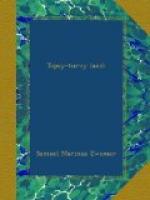As they did then, so at sunrise and at noon and at four o’clock and sunset and when the evening star disappeared—five times a day—they prayed. It is not true, as is generally supposed, that women in Moslem lands do not pray. Only at Mecca, as far as I know, of all Arabia, are they allowed a place in the public mosques, but at home a larger per cent. observe the times of prayer than do the men.
When Noorah had ended her prayer and resumed the task of belabouring the white camel, she turned to me with a question, "Laish ma tesully anta?" which with Bedouin bluntness means, “You, why don’t you pray?” The question set me musing half the night; not, I confess, about my own prayers, but about hers. Why did Noorah pray? What did Noorah pray? Did she understand that
Prayer is the burden of a
sigh, the falling of a tear,
The upward glancing of the
eye when only God is near,
as well as the dead formalism of the mosque? How could I answer her question in a way that she might well understand? And if hers, too, was a sincere prayer, as I believe,—the prayer of an ignorant child of the desert,—did she pray words or thoughts? What do Noorah and her more than two million Bedouin sisters ask of God five times daily? Leaving out vain repetitions, this is what they say:
“In the name of God
the Merciful, the Compassionate;
Praise be to God who the two
worlds made;
Thee do we entreat and Thee
do we supplicate;
Lead us in the way the straight,
The way of those whom Thou
dost compassionate,
Not of those on whom is hate
Nor those that deviate.
Amen.”
It is the first chapter of the Koran and is used by Moslems as we use the Lord’s Prayer. The words are very beautiful I think, don’t you?
Whether Noorah understood what she asked I know not; but to me who saw and heard in the desert twilight, (as under like conditions to you), the prayer was full of pathos. The desert! where God is, and where but for His mercy and compassion death and solitude would reign alone; the desert, a world of its own kind, a sea of sand, with no life in it except the Living One, and over it only His canopy of stars—God of the two worlds! And to that God, than whom there is no other, and whom they ignorantly worship, these sons and daughters of outcast Ishmael bow their faces in the dust and five times daily entreat and supplicate to be led aright in the way of truth.




